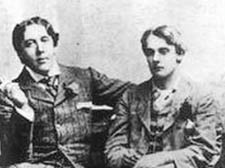|
|
 |
| |
 Lord Alfred Douglas pictured with Oscar Wilde Lord Alfred Douglas pictured with Oscar Wilde |
Poetic truths from great nephew of the lover who brought down Wilde
John Calder reviews a collection of poems by Lord Gawain Douglas, the great nephew of ‘Bosie’ – Lord Alfred Douglas
Fortuna. By Gawain Douglas.
Herla (an imprint of Alma Books) £9.99.
THERE are few families with a history as long as that of the Scottish border family Douglas.
For centuries the Douglases raided northern England, stealing cattle, fighting their rivals the Percys just south of Scotland, and generally terrorising all who stood in their way.
Their reputation for fierceness was countered by the large number of notable poets they produced. They included Gavin Douglas in the 16th century, William Douglas who wrote the words of “Annie Lawrie”, and Lord Alfred Douglas, notorious for having brought down Oscar Wilde by urging him to sue his father, the Marquis of Queensberry.
Gawain Douglas, also a Lord and a great nephew of Lord Alfred (“Bosie”), is a modern poet as well as being a musician and teacher, living in Deal with his conventional family.
Written over many years, Fortuna is a collection that owes much to its author’s musicality, but also to his artist’s eye that turns many of the poems into interesting visual patterns on the page.
Sometimes, because a poem comments in a marginal way on its own discovery of words, it is unsuitable for reading aloud, but that does not apply to most of them. Indeed, Lord Gawain is a very fine reader of both his own poems and those of, among others, Bosie, whose reputation, much tarnished because of the Oscar Wilde scandal, he vigorously defends in his lectures.
Nature plays a large part in this volume, sometimes awakened by the seasons, a beach scene or a glimpse of flowers or trees.
Everyday thoughts and observations spark off comments on our frailties, our fears, our follies and our actions.
The pattern of words on the page is never accidental, but intended to give an extra visual dimension to many of the sentiments expressed, sometimes in free verse, sometimes formally as in a sonnet.
One section is entitled “Gin” and one suspects that the occasional glass of it had much to do with the writing of some of these poems.
There are not many poets who have not found some of the inspiration and even subject matter in a glass of wine or spirits at the moments of sitting down with the idea of a poem forming in the mind. But there is no obvious allusion to drink.
The reader is most aware of Douglas’s impressionistic glance at a moment in time, his awareness that whatever the moment is, it cannot ever come back the same way, but that it can stick in the memory as a moment of sudden truth.
In fact the search for truth, for something, some special meaning that might underlie the apparent banality of most existence, gradually emerges as a key to his thinking as one rereads these poems, so often about the everyday observation, but seen differently, in patterns that form themselves into uneven lines that exude music as well as verbal rhythms. Truth can lie in contemplating what one sees all the time, such as folded hands that make it impossible to lie to oneself – as in his poem “Fold”, for instance (see box).
There is humour too in these poems, but it is sometimes sinister, cynical or slightly obscure.
Old women he sees at a bus stop he knows are dead, but of course only he knows it.
He finds humour in politenesses, in a poetry factory where everything has ground to a halt, but a new apprentice called William (or Will) has just arrived, in the meaningless meanings that the wise invent for the novice, in the ways that pointless time is given some point, although there is none.
Poetry is the art of understanding oneself, and a successful poet can make his readers realise that meaning is in the mind and only the mind can give life and the external world a presence that enables one to penetrate that world.
Because it is short and brutal, above all moral, life is tragedy and all good literature makes us realise that.
Habit dulls the senses, but the discovery of reality through the insight of a poet give us the courage to face the truth of life and to realise, as Gawain Douglas says: “You leave here as you came, alone.”
Fold
The truth lies in the hands the truth sits in the hands the truth
is not in face or eyes or voice the truth folds into hands not
shoulders nor the forward step nor backward look but sleep or
wake or night or day the truth is in the hands yes
Hold them out Close them tight Move one to left
Move one to right Fold them unfold
They cannot lie these hands by day or night although they try
Look at your hands
Gawain Douglas, January 6, 2008 |
 |
|
 |
 |
|
 |
|
 Lord Alfred Douglas pictured with Oscar Wilde
Lord Alfred Douglas pictured with Oscar Wilde
